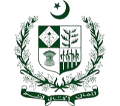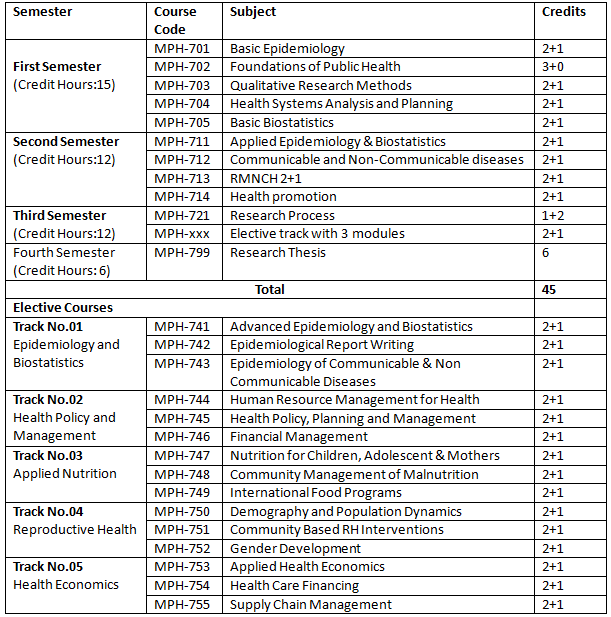Master of Science In Public Health (MSPH)
The Health Services Academy (HSA), the first-ever Degree Awarding Institute (DAI) of Public Health Sciences in Pakistan recognized by the Higher Education Commission of Pakistan. The mission of HSA is to strengthen the capacity of public health professionals by offering excellence in teaching
research, service and policy advice. HSA envisages to become a nationally and internationally recognized center of excellence in Public Health, contributing to the health and well-being of the People of Pakistan and around the world.
Goal of The MSPH Programme
The MSPH programme offered by HSA aims to improve the health status of the population, which is to be achieved by providing public health and health care professionals with a high-quality postgraduate training programme in public health sciences.
Objectives of the MSPH Programme
The graduates of the MSPH programmes are prepared to:
1. Solve health-related problems within the financial, socio-cultural, environmental and political framework of Pakistan and its surrounding region.
2. Design, conduct, analyze and interpret the results of relevant studies, projects and programmes.
3. Initiate, plan, manage, monitor and evaluate interventions in the field of public health.
4. Communicate public health messages to diverse audience effectively.
5. Advocate sound public health policies and practices. The MSPH at HSA provide experienced professionals with a thorough grounding in population-based approaches to health sector problem identification, investigation, analysis and managed response
Goal of The MSPH Programme
The MSPH programme offered by HSA aims to improve the health status of the population, which is to be achieved by providing public health and health care professionals with a high-quality postgraduate training programme in public health sciences.
Objectives of the MSPH Programme
The graduates of the MSPH programmes are prepared to:
1. Solve health-related problems within the financial, socio-cultural, environmental and political framework of Pakistan and its surrounding region.
2. Design, conduct, analyze and interpret the results of relevant studies, projects and programmes.
3. Initiate, plan, manage, monitor and evaluate interventions in the field of public health.
4. Communicate public health messages to diverse audience effectively.
5. Advocate sound public health policies and practices. The MSPH at HSA provide experienced professionals with a thorough grounding in population-based approaches to health sector problem identification, investigation, analysis and managed response
The Eligibility Criteria of Masters of Science in Public Health (as per approved HEC)
• MBBS (Registered with PMDC)
• BDS (Registered with PMDC)
• MD (Registered with PMDC)
• BSc Nursing 04 Years (Registered with PNC)
• DVM (Registered with Veterinary Council)
• BSc Paramedics 04 Years
• Pharm D / Equivalent (Registered with Pharmacy Council)
• BS Physiotherapy / Equivalent
• 16 Years of Education in case of
• BS Social Sciences (Sociology / Psychology / Anthropology)
• BS Environmental Sciences
• BS Nutrition and Equivalent
• Master’s in Business Administration
• MBBS (Registered with PMDC)
• BDS (Registered with PMDC)
• MD (Registered with PMDC)
• BSc Nursing 04 Years (Registered with PNC)
• DVM (Registered with Veterinary Council)
• BSc Paramedics 04 Years
• Pharm D / Equivalent (Registered with Pharmacy Council)
• BS Physiotherapy / Equivalent
• 16 Years of Education in case of
• BS Social Sciences (Sociology / Psychology / Anthropology)
• BS Environmental Sciences
• BS Nutrition and Equivalent
• Master’s in Business Administration
MSPH Programme Organization And Structure
The intensive curriculum emphasizes basic public health sciences, essential managerial and analytical skills including project planning and evaluation, epidemiological investigations, health systems analysis and research, reproductive and child health, environmental and occupational health, disease control, and effective communication and leadership. It adopts a discipline-based approach to address the core competencies. The curriculum is organized around a guiding framework, which first provides students a conceptual overview of the diverse profession of public health and team-oriented approach to professional practice as well as practicum.
The courses are taught in either a concurrent or modular manner to build upon and integrate with each other. The first semester curriculum provides exposure to the breadth of public health disciplines. The second semester curriculum provides advanced training in key methodological and programmatic disciplines which continues into the third semester, along with electives and a student-directed thesis. The Dissertation integrates public health knowledge, skills, and methods in a professionally and personally relevant practice context. Elective courses are offered only during the third semester if minimally eight participants enroll for a course. New credited courses will be subsequently introduced on a need-and-demand basis in the coming years. In the fourth semester the students of MSPH proceed to their respective workplace and apply the skills that they learnt in the first three semesters. Students can benefit from the supervision and mentoring and practical experience while addressing the health needs of Pakistan is a useful experience
MSPH Programme Duration, Credits And Medium of Instruction
The MSPH degree programme is of twenty-four (24) months comprising four semesters. The first two semesters are dedicated to course work, culminating in an end-of-semester examination. In the third semester, the examination is held by mid-semester, and the remaining time is to be used to complete student dissertations. During the first three semesters, students are expected to attend all classes at the HSA; however, during the fourth semester, they are expected to return to a job environment and carry out an on-the-job assignment as part of their practicum. All semesters are followed by semester break of up to four weeks’ duration. In the third semester all students have to conduct a field project leading to a dissertation. In the fourth semester every student has to carry out a practicum (on-the-job assignment) and submit a short-written report and an appraisal from the immediate supervisor/mentor.
The total programme consists of 60 credits. One credit is equivalent to 16-18 hours of formal teaching/contact hours or 48-54 hours of practical fieldwork. Practical fieldwork is defined as consisting of individual fieldwork, group fieldwork, field visits, individual assignments and class exercises.
English is the medium of instruction and examination for the MSPH programme.
English is the medium of instruction and examination for the MSPH programme.
Method Of Assessment/Examination For MSPH (2 Year Programme)
The students are evaluated during each course on the basis of:
• Formative assessment which is a mix of the tests, end of course examination, class and home assignments, class participation, interactive discussions, practical exercises and/or group works depending on the course outline (ongoing assessment);
• Summative assessment based on the end of semester examination papers. Summative assessments are held at the end of first two semesters and comprise of two semester papers each. In the third semester, the students are examined in the mid-semester summative assessment before the start of the Dissertation work. The dissertation work is assessed through a viva voce examination on the basis of a structured format covering the quality of the project, work performed in the field, data generation and analysis and presentation of results, discussion and conclusions presented as a written report. In the fourth semester the students go back to their workplaces and apply the skills learned in the first three semesters. At the end of the semester an on-job written report will be submitted by the students in addition to the written appraisal by the designated supervisor/mentor.
• Fifty percent marks shall be reserved for the ongoing (formative) assessment and fifty percent for the semester examination paper and dissertation (summative assessment).
• Formative assessment which is a mix of the tests, end of course examination, class and home assignments, class participation, interactive discussions, practical exercises and/or group works depending on the course outline (ongoing assessment);
• Summative assessment based on the end of semester examination papers. Summative assessments are held at the end of first two semesters and comprise of two semester papers each. In the third semester, the students are examined in the mid-semester summative assessment before the start of the Dissertation work. The dissertation work is assessed through a viva voce examination on the basis of a structured format covering the quality of the project, work performed in the field, data generation and analysis and presentation of results, discussion and conclusions presented as a written report. In the fourth semester the students go back to their workplaces and apply the skills learned in the first three semesters. At the end of the semester an on-job written report will be submitted by the students in addition to the written appraisal by the designated supervisor/mentor.
• Fifty percent marks shall be reserved for the ongoing (formative) assessment and fifty percent for the semester examination paper and dissertation (summative assessment).
1st Semester fee: Rs208,506
2nd Semester fee: Rs174,502
3rd Semester fee: Rs174,502
4th Semester fee: Rs139,502
2nd Semester fee: Rs174,502
3rd Semester fee: Rs174,502
4th Semester fee: Rs139,502


